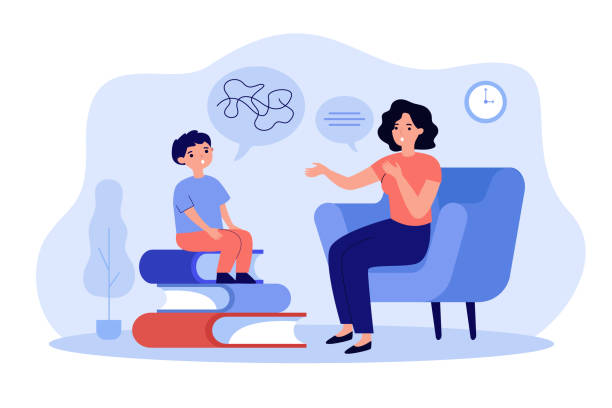Can a Speech Pathologist Help with Stuttering? Here’s What You Need to Know
Can a Speech Pathologist Help with Stuttering? Here’s What You Need to Know
Blog Article
How a Speech Pathologist Can Help Improve Interaction Abilities
Effective communication is a cornerstone of individual and specialist success, yet many people deal with difficulties that prevent their ability to express themselves clearly. A speech pathologist is furnished to deal with these barriers via targeted assessment and intervention techniques tailored to each individual's requirements. By utilizing evidence-based restorative methods, they not only work to enhance speech and language problems however likewise enhance total communicative capability. Comprehending the complex duty of a speech pathologist discloses exactly how their proficiency can change lives, welcoming a closer examination of the particular approaches and results linked with their practice.
Understanding Interaction Conditions
Understanding interaction conditions is crucial for acknowledging how they affect individuals' capability to express themselves and involve with others. Communication problems incorporate a vast array of difficulties that influence speech, language, and social interaction, typically preventing reliable communication. These problems can emerge from different variables, consisting of neurological problems, developmental hold-ups, physical problems, or psychological issues.
Speech disorders may materialize as problems in articulation, fluency, or voice manufacturing, impacting how words are noticable or talked. Language problems, on the various other hand, involve obstacles in understanding or utilizing language, which can restrain both verbal and non-verbal interaction. Social communication disorders are defined by problems in the pragmatic facets of communication, such as taking turns in discussion or understanding social signs.
The repercussions of interaction problems are profound, influencing not just the individual's capability to communicate feelings and thoughts but likewise their social connections, instructional possibilities, and total high quality of life. Understanding of these problems can foster empathy and assistance, encouraging effective approaches for interaction and interaction. Understanding the intricacies of interaction disorders is a crucial action in the direction of promoting inclusivity and addressing the needs of those affected.
Role of a Speech Pathologist
Speech pathologists regularly play a crucial duty in identifying and treating communication problems, using a variety of evidence-based methods customized to each individual's requirements. These professionals work with individuals across the lifespan, from kids with speech hold-ups to adults recouping from strokes or traumatic brain injuries. Their know-how encompasses a selection of interaction issues, consisting of expression, fluency, language, and voice conditions.
In healing setups, speech pathologists utilize organized interventions designed to boost interaction abilities. They might carry out strategies such as speech workouts, language games, and social interaction training to assist in renovations in expressive and receptive language abilities. Speech Pathologist. In addition, they inform customers and their households regarding reliable communication strategies and adaptive methods to navigate daily communications
Beyond direct therapy, speech pathologists work together with various other healthcare professionals, caretakers, and teachers to make sure a comprehensive technique to therapy. They advocate for clients by supplying resources and support, making it possible for people to attain their communication goals and boost their overall top quality of life. As experts in the field, speech pathologists are necessary in cultivating effective interaction, advertising freedom, and improving social participation for those with interaction obstacles.
Evaluation and Medical Diagnosis Process
The evaluation and diagnosis procedure conducted by speech pathologists usually entails a detailed analysis to recognize communication disorders precisely. This process begins with a detailed medical history, where the clinician gathers pertinent information about the individual's clinical, educational, and developing background. Recognizing the context of the individual's communication difficulties is important for an exact medical diagnosis.
Complying with the instance history, speech pathologists use casual analyses and standardized tests to review different elements of communication, including speech sound manufacturing, language comprehension, he has a good point expressive language, and social communication skills. These analyses are tailored to the individual's age and certain worries, providing valuable data for evaluation.
Monitoring is also a crucial element of the evaluation procedure, as it permits the medical professional to see direct exactly how the private interacts in all-natural settings. Furthermore, meetings with member of the family and instructors can give understanding into the individual's communication obstacles across various environments.
When the examination is full, the speech pathologist synthesizes the findings to determine a diagnosis and suggest ideal interventions. This detailed evaluation procedure makes certain that people receive targeted support customized to their unique communication needs, laying the foundation for efficient restorative techniques.
Healing Strategies and Strategies
Many therapeutic methods and approaches are employed by speech pathologists to attend to a range of communication conditions effectively. One extensively utilized technique is expression treatment, which focuses on correcting speech appears via rep and aesthetic hints. This method is specifically advantageous for people with speech sound problems.
An additional reliable method is language intervention, which boosts both expressive and responsive language abilities. This might entail interactive activities that promote vocabulary advancement, syntax understanding, and conversational abilities. In addition, speech pathologists usually use social skills educating to enhance pragmatic language capacities, enabling people to navigate social communications more effectively.
Fluency shaping and stuttering adjustment techniques are specifically designed to aid those experiencing fluency disorders. These strategies aid customers develop smoother speech patterns and manage the emotional and physical elements of stuttering.
Furthermore, augmentative and different interaction (AAC) systems are used for people with extreme interaction problems. These systems, which can include motions, symbols, or digital gadgets, give vital assistance for effective communication.
Benefits of Speech Therapy

Additionally, speech treatment can aid in establishing important listening and comprehension skills, promoting much better communication in conversations. People with cognitive-communication problems can also profit, as treatment concentrates on strengthening memory and problem-solving capacities, important for efficient interaction.
One more vital facet is the psychological support offered during therapy sessions. Speech pathologists develop a risk-free setting, motivating individuals to conquer anxiousness and aggravation related to their interaction issues. This assistance can cause boosted self-worth and overall psychological wellness.
Additionally, early treatment through speech therapy can stop more difficulties, making certain that individuals reach their full communicative possibility. Overall, the benefits of speech therapy expand past mere speech enhancement, positively impacting numerous measurements of life for those impacted by communication difficulties.
Verdict
In summary, speech pathologists play an essential function in resolving communication problems via analysis, medical diagnosis, and tailored restorative interventions. By employing evidence-based methods, these specialists improve individuals' speech and language capacities, fostering boosted clearness, fluency, and social interaction skills. The benefits of very early intervention underscore the value of looking for support from speech pathologists, as their proficiency can dramatically enhance communicative potential, inevitably leading to greater success in both specialist and personal balls.

Speech pathologists regularly play a vital duty in dealing with and detecting communication conditions, using my latest blog post an array of evidence-based strategies tailored to each individual's requirements. As specialists in the area, speech pathologists are crucial in fostering reliable interaction, promoting self-reliance, and improving social involvement for those with communication obstacles.

Report this page